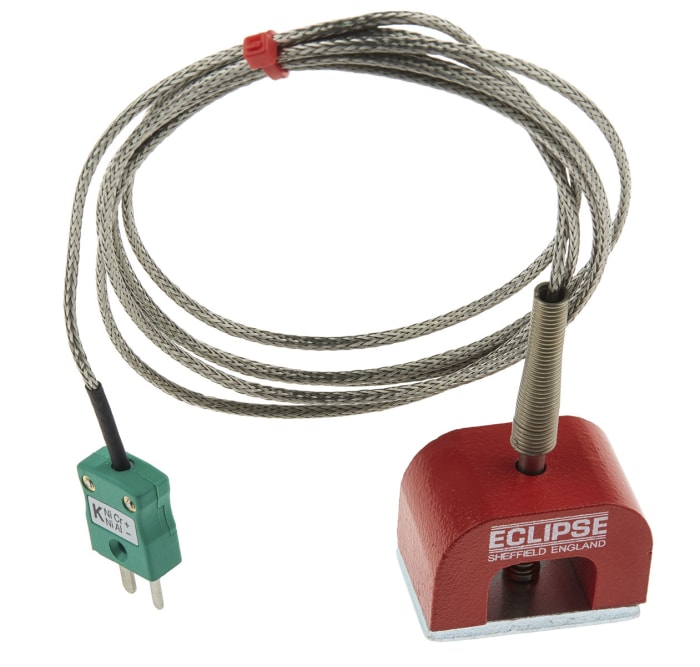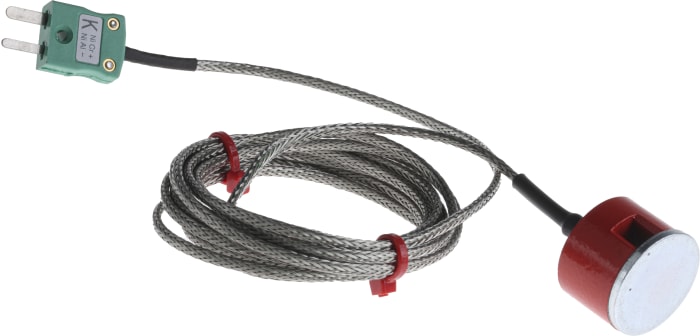RS PRO Type K Thermocouple 6mm Diameter → +250°C

Технически документи
Спецификации
Brand
RS ProThermocouple Type
K
Probe Diameter
6mm
Probe Material
Stainless Steel
Maximum Temperature Sensed
+250°C
Termination Type
Miniature Plug
Cable Length
1m
Standards Met
IEC
Страна на произход
United Kingdom
Детайли за продукта
RS Pro IEC Type K Button Magnet Thermocouple with Miniature Plug
From RS Pro an IEC standard Type K thermocouple temperature sensor designed for taking surface temperature measurements. The thermocouple lead is made from twin-twist wire with a durable PTFE insulation. One end of the lead is terminated with a miniature plug for a quick and easy connection. The other end of the wire is terminated with a in diameter button magnet designed for attaching ferrous metal surfaces. The junction of this thermocouple is grounded for a fast response time.
How does a Thermocouple Work?
A thermocouple is a sensor used to measure temperature in a range of different processes and consists of two wire legs made from different metals joined together at their two ends to form two junctions. The hot, or measuring junction is connected to the body whose temperature is going to be measured. The cold junction or reference junction is connected to a body of known temperature. When the measuring junction is placed on something hot a voltage or potential difference between this and the reference junction occurs. This voltage can then be converted into a temperature measurement using thermocouple reference tables. This process is also known as the Seebeck Effect
What is a Surface Thermocouple?
This thermocouple is designed for measuring the temperature on a surface. Most thermocouples have a sensing tip where there ends of the thermocouple wires are encased in sheaths or protection tubes which do not allow for measuring the temperature of a surface area. In surface temperature sensing thermocouples the exposed welded wire junction is housed in a magnet or adhesive patch which provides a true surface contact. This affixing method allows these thermocouples to be used on many types of surfaces including uneven and circular surfaces. They are also simple to use and easy to replace and position.
Features and Benefits
• Conforms to IEC standards
• Grounded thermocouple tip for fast response time
• Button magnet for accurate surface sensing on metal surfaces
• Miniature plug (200°) for quick and easy connection
• Durable PTFE insulated leads for protection against oils, acids and fluids and for good mechanical strength and flexibility
• Sensor temperature range of up to 250°C
Applications
Type K Thermocouples (Nickel-Chromium / Nickel-Aluminium) are the most common type of thermocouple and are both accurate and flexible with a wide temperature range. Typical applications for these mineral insulated Type-K thermocouple probes include heat exchangers, power stations, brick and cement kilns, heat treatment and annealing furnaces, thermostats, food thermometers, vehicle diagnostics and in laboratories

Информацията за складовите наличности временно не е налична.
€ 62,63
€ 62,63 Всеки (ex VAT)
1
€ 62,63
€ 62,63 Всеки (ex VAT)
Информацията за складовите наличности временно не е налична.
1
| количество | Единична цена |
|---|---|
| 1 - 4 | € 62,63 |
| 5 - 9 | € 60,82 |
| 10+ | € 58,19 |

Технически документи
Спецификации
Brand
RS ProThermocouple Type
K
Probe Diameter
6mm
Probe Material
Stainless Steel
Maximum Temperature Sensed
+250°C
Termination Type
Miniature Plug
Cable Length
1m
Standards Met
IEC
Страна на произход
United Kingdom
Детайли за продукта
RS Pro IEC Type K Button Magnet Thermocouple with Miniature Plug
From RS Pro an IEC standard Type K thermocouple temperature sensor designed for taking surface temperature measurements. The thermocouple lead is made from twin-twist wire with a durable PTFE insulation. One end of the lead is terminated with a miniature plug for a quick and easy connection. The other end of the wire is terminated with a in diameter button magnet designed for attaching ferrous metal surfaces. The junction of this thermocouple is grounded for a fast response time.
How does a Thermocouple Work?
A thermocouple is a sensor used to measure temperature in a range of different processes and consists of two wire legs made from different metals joined together at their two ends to form two junctions. The hot, or measuring junction is connected to the body whose temperature is going to be measured. The cold junction or reference junction is connected to a body of known temperature. When the measuring junction is placed on something hot a voltage or potential difference between this and the reference junction occurs. This voltage can then be converted into a temperature measurement using thermocouple reference tables. This process is also known as the Seebeck Effect
What is a Surface Thermocouple?
This thermocouple is designed for measuring the temperature on a surface. Most thermocouples have a sensing tip where there ends of the thermocouple wires are encased in sheaths or protection tubes which do not allow for measuring the temperature of a surface area. In surface temperature sensing thermocouples the exposed welded wire junction is housed in a magnet or adhesive patch which provides a true surface contact. This affixing method allows these thermocouples to be used on many types of surfaces including uneven and circular surfaces. They are also simple to use and easy to replace and position.
Features and Benefits
• Conforms to IEC standards
• Grounded thermocouple tip for fast response time
• Button magnet for accurate surface sensing on metal surfaces
• Miniature plug (200°) for quick and easy connection
• Durable PTFE insulated leads for protection against oils, acids and fluids and for good mechanical strength and flexibility
• Sensor temperature range of up to 250°C
Applications
Type K Thermocouples (Nickel-Chromium / Nickel-Aluminium) are the most common type of thermocouple and are both accurate and flexible with a wide temperature range. Typical applications for these mineral insulated Type-K thermocouple probes include heat exchangers, power stations, brick and cement kilns, heat treatment and annealing furnaces, thermostats, food thermometers, vehicle diagnostics and in laboratories



